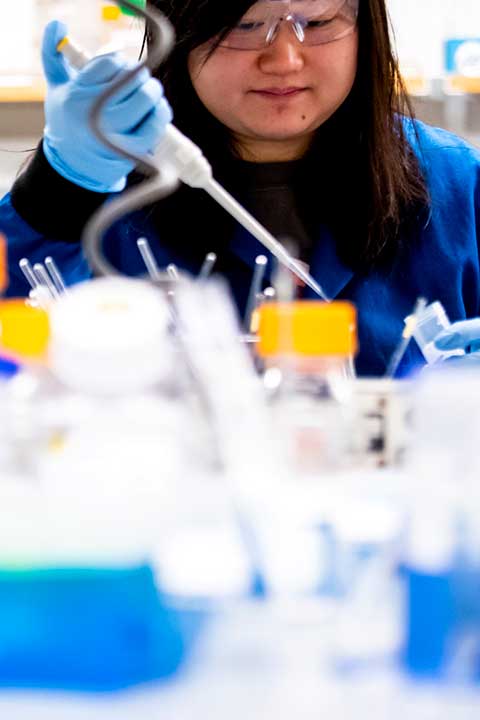
Master of Science in Pharmaceutical Engineering
Master of Science in Pharmaceutical Engineering
Overview
The Master of Science (MS) in Pharmaceutical Engineering is an interdisciplinary program offered through the Department of Chemical Engineering and the Department of Pharmaceutical Sciences at Northeastern University. Through coursework and rich experiential learning, the program prepares engineers with a unique blend of advanced skills in state-of-the art pharmaceutical design, manufacturing process engineering, regulatory and quality issues to meet the evolving and growing needs of the biotechnology industry.
Innovative Curriculum
Students gain the knowledge and skills to work in the pharmaceutical field to analyze and design the engineering aspects of pharmaceutical development, operations, and manufacturing processes. They are also prepared to describe the regulations and good manufacturing practices that are specific to the pharmaceutical industry, as well as communicate effectively within pharmaceutical engineering, in multidisciplinary teams, and between regulatory and quality programs.
As part of the MS program, students will gain hands-on experience in modern experimental techniques, including bioreactor operation, downstream purification, and cell culture. The program emphasizes the most current research in biopharmaceuticals—the fastest-growing segment of the pharmaceuticals field—and covers highly relevant topics including mRNA. Students will also gain a strong understanding of Quality by Design (QbD) and its importance in FDA review.
The program is full-time and non-thesis based.
Students have the opportunity to gain advanced interdisciplinary training in chemical engineering and pharmaceutical sciences with core and elective classes in both.
The program allows students to align coursework to their career goals. Students may choose to focus in either engineering or pharmaceuticals sciences courses, or on such areas as regulatory issues, to balance current strengths and design their own career paths.
Over 15 graduate certificates are available to provide students the opportunity to develop a specialization in an area of their choice. Certificates can be taken in addition to or in combination with a master’s degree, or provide a pathway to a master’s degree in Northeastern’s College of Engineering. Some certificates include process safety engineering, pharmaceutical technologies, and nanomedicine. Some master’s programs can also be combined with a Gordon Engineering Leadership certificate. Students should consult with their faculty advisor regarding these options.
- Analyze and design the engineering aspects of pharmaceutical development, operations and manufacturing processes.
- Describe the regulations and good manufacturing practices that are specific to the pharmaceutical industry.
- Communicate effectively within pharmaceutical engineering, in multidisciplinary teams, and between relevant regulatory and quality programs.
Experiential Learning
Northeastern’s co-op program offers students a unique opportunity to integrate their academic knowledge with industry experience. Students may gain up to eight months of full-time work experience as part of the academic curriculum, allowing them to build their resume, develop a professional network, and gain a competitive edge upon graduation. Northeastern’s location in Boston and its industry collaborations create innovative co-op opportunities for pharmaceutical engineering students. Northeastern is ranked No. 1 in internships/co-ops by U.S. News and World Report, and is one of only a few universities offering graduate students the opportunity to participate in co-op.
Program Goals
There is a growing need for engineers with advanced skills in state-of-the-art pharmaceutical design, manufacturing processes, and regulatory and quality aspects, including cross-functional pharmaceutical engineering knowledge in clinical development, manufacturing, and rigorous quantitative approaches.
Northeastern is one of only a few programs nationwide to combine engineering and pharmaceutical sciences to address this market need. Upon graduation, students will be prepared for in-demand roles in drug development/manufacturing, validation/regulatory compliance, quality control, and more.
Chemical engineers in pharmaceuticals had a median salary of $100,800 in 2018, while the mean salary was $107,180, according to the U.S. Bureau of Labor Statistics.
Along with California, Massachusetts offers the nation’s strongest market for careers in pharmaceuticals, especially biopharmaceuticals.
Academic Advising
The Academic Advisors in the Graduate Student Services office can help answer many of your questions and assist with various concerns regarding your program and student record. Use the link below to also determine which questions can be answered by your Faculty Program Advisors and OGS Advisors.
Admissions & Aid
Ready to take the next step? Review degree requirements to see courses needed to complete this degree. Then, explore ways to fund your education. Finally, review admissions information to see our deadlines and gather the materials you need to Apply.